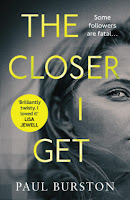Today it's my pleasure to welcome Paul Burston, author of The Closer I Get, to the blog ahead of his appearance at next month's Salisbury Literary Festival.
Can you tell us a bit about yourself and your writing journey.
I’ve always written stories, since I was a small child. I wrote short stories and puppet shows for my marionettes Goofy, Pinky and Perky, Ermentrude and The Witch. I had a very vivid imagination! I tried writing several novels as a teenager - all abandoned. I then studied English Literature and Drama at university and wrote and directed a few fringe productions. In my mid 20s, the AIDS crisis impacted on my circle of friends and I became very politicised. I joined the AIDS activist group ACT-UP and started writing opinion pieces for various newspapers and magazines.
I later became an editor at Time Out and co-founded Attitude magazine. I also published four non-fiction books. Then in 1999 my editor suggested I write a novel and in 2001 my gay rom-com Shameless was published. I wrote three more novels in a similar vein before turning to crime fiction in 2016 with The Black Path.
If you had to give an elevator pitch for The Closer I Get, what would it be?
A novelist with writer’s block attracts the attention of an online admirer and is drawn into the dark side of social media.
Tom is a successful author, but he’s struggling to finish his novel. His main distraction is an online admirer, Evie, who simply won’t leave him alone.
Evie is smart, well read and unstable; she lives with her father and her social-media friendships are not only her escape, but everything she has.
When she’s hit with a restraining order, her world is turned upside down, and Tom is free to live his life again, to concentrate on writing.
But things aren’t really adding up. For Tom is distracted but also addicted to his online relationships, and when they take a darker, more menacing turn, he feels powerless to change things. Because maybe he needs Evie more than he’s letting on.
They say write what you know and for you this was scarily the case, did you find it cathartic to use your own experiences of online trolling to write this story?
Yes, very much so. I had a few doubts at first. The real life experience was deeply unsettling and traumatic and I feared I might reopen old wounds. But in order for the book to work, I had to get inside the head of the stalker and discover what made them tick. Writing the book became a way of working through my emotions. I went from being very angry with the person who stalked me to feeling sorry for them.




